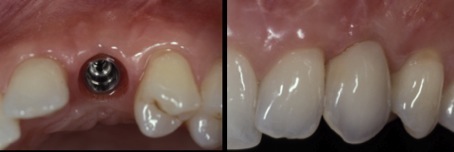
Implantology
Dental implants
Implantology is a technique that is both proven, with more than 50 years of experience in treatment, and innovative. Indeed, technical improvements are made very regularly to reduce healing time and the number of operations.
It consists of placing a dental implant, similar to an artificial root, in the jawbone. It consists of a titanium screw placed in the jawbone. It replaces the root(s) of an absent tooth and serves as a support for what will replace the tooth: a crown, a bridge or a removable prosthesis.
The care
A dental implant can be placed either immediately after the extraction of a tooth or after the bone and gums have healed 3 months after extraction.
The surgical procedure is often simple, not very painful and is performed under local anaesthesia.
However, its success is based on precise radiological and clinical examinations and the application of a rigorous method.
Once the jawbone has solidified around the implant (2 to 6 months), the visible part that will replace the extracted tooth or teeth can be placed on the implant. For example, a ceramic crown of the same shade as your other teeth. Your new tooth then consists of 2 parts: the crown which is the visible part above the gum and the implant under the gum, in the bone, which replaces your old root.
But the implant can also be used under partial or total removable dentures, to ensure a good fit of the prosthesis.

As an alternative to the placement of an implant, the extracted tooth or teeth can also be replaced by a fixed prosthesis or by a partial or total removable prosthesis (denture). But the implant has many advantages over these techniques. In terms of comfort, it is a fixed, therefore stable reconstruction that will give you the impression of chewing on a real tooth. Aesthetically there is no unsightly metal hook. Concerning the ecology of the mouth, the implant prevents the decay of adjacent teeth. This technique is often recommended when it is feasible.


